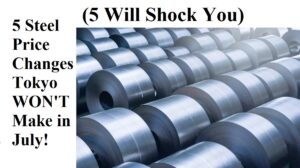5 Steel Price Changes Tokyo WON’T Make in July! (5 Will Shock You)
Tokyo Steel Manufacturing has decided to keep its steel prices unchanged for July, marking the fifth consecutive month of price stability. This decision comes as the company closely monitors global market trends, particularly the impact of rising steel exports from China, which have contributed to a weaker international market. Despite uncertainties in Japan’s construction sector and fluctuating automobile demand, Tokyo Steel is prioritizing price stability to support customers and maintain market confidence.
For July, the price of hot rolled coils remains at 107,000 yen ($679) per metric ton, while H-shaped beams stay at 127,000 yen per metric ton. This move is significant as major competitors, including Posco, Hyundai Steel, and Baoshan Iron & Steel, closely follow Tokyo Steel’s pricing strategy. By maintaining steady rates, the company reinforces its commitment to reliability, helping businesses plan more effectively amid market fluctuations. This approach not only strengthens customer trust but also contributes to overall industry stability. In a volatile global steel market, Tokyo Steel’s decision sends a strong message of resilience and long-term strategic thinking.

5 Steel Price Changes Tokyo WON’T Make in July! (5 Will Shock You)
For the fifth consecutive month, Tokyo Steel Manufacturing has announced that it will maintain its current steel prices through July 2025. This decision highlights the company’s strategic approach amid a turbulent global market, particularly in response to rising steel exports from China and fluctuating demand in key industries.
Why Prices Remain Unchanged
As Japan’s leading steel producer using electric-arc furnace technology, Tokyo Steel confirmed on Monday that its pricing will stay the same for July. Despite challenges such as unpredictable construction activity in Japan and fluctuating demand from automakers, the company has prioritized customer support and market stability. By keeping prices steady, Tokyo Steel aims to build trust with businesses that rely on its products and ensure long-term stability in the domestic steel market.
July 2025 Pricing Details
- Hot Rolled Coils: 107,000 yen (approximately $679) per metric ton
- H-Shaped Steel Beams: 127,000 yen per metric ton
These figures have remained unchanged since March 2025, reflecting the company’s commitment to predictability amid global economic uncertainty.
Global Steel Market Dynamics
Tokyo Steel’s pricing strategy is closely watched by competitors worldwide, including South Korea’s Posco and Hyundai Steel, as well as China’s Baosteel. By refusing to adjust prices—even as Chinese steel floods international markets at lower rates—Tokyo Steel sends a clear message: the company prioritizes reliability over engaging in a price war.
China’s steel exports have surged in recent months, driven by slowing domestic demand and excess production capacity. This has intensified global competition, pushing prices down and squeezing profit margins for manufacturers. However, Tokyo Steel’s decision to hold its ground reflects its confidence in balancing competitiveness with long-term customer relationships.
Challenges in Key Sectors
Construction Industry Uncertainty
Japan’s construction sector, a major consumer of steel, has faced project delays due to rising material costs and labor shortages. While public infrastructure projects supported by government funding provide some stability, private-sector investments have slowed. Tokyo Steel’s stable pricing allows contractors to plan their budgets without worrying about unexpected cost hikes.
Fluctuations in Automobile Demand
Automakers, another critical segment of the steel market, are experiencing an uneven recovery. While electric vehicle (EV) production is on the rise, traditional vehicle sales remain sluggish due to economic uncertainty. Steel suppliers like Tokyo Steel must navigate these shifts, supporting automakers as they transition to EV manufacturing while also maintaining supply chains for conventional vehicle production.
Stability Over Short-Term Gains
Tokyo Steel’s approach differs from competitors in China and Southeast Asia, where some producers have slashed prices to secure orders. Frequent price adjustments, however, can undermine buyer confidence and create market volatility. By maintaining steady pricing, Tokyo Steel positions itself as a dependable partner for industries that rely on stable supply chains.
Analysts note that Japanese manufacturers often emphasize stability to align with the country’s business culture, which values long-term partnerships. This strategy also protects customers from sudden cost increases due to currency fluctuations or rising raw material prices, such as iron ore and scrap metal.
What’s Next for the Steel Industry?
The global steel market is expected to remain under pressure throughout 2025. China’s export-driven strategy shows no signs of slowing, and weak demand in Europe and North America adds to the oversupply problem. However, emerging industries such as renewable energy and infrastructure development could drive future demand for specialized steel products.
For now, Tokyo Steel’s focus on price consistency may help it maintain market share in Japan while competitors abroad struggle with pricing battles. The company’s ability to absorb cost pressures—without passing them on to customers—relies on efficient operations and strategic sourcing of raw materials.
Key Takeaways
- Fifth Month of Stable Pricing – Tokyo Steel’s July prices match those from March through June 2025, emphasizing predictability.
- Impact of Chinese Exports – Increased steel production from China continues to drive down global prices.
- Support for Domestic Markets – Steady pricing helps Japan’s construction and auto industries manage costs amid uncertain demand.
- Competitive Positioning – Global rivals monitor Tokyo Steel’s pricing decisions to gauge market trends.
- Long-Term Strategy – The company values customer loyalty over short-term profit gains.
Final Thoughts
Tokyo Steel’s decision to keep prices unchanged reflects a strategic effort to navigate a volatile global market while supporting its clients. As steel industry dynamics continue to evolve, the company’s commitment to stability may prove vital for businesses that rely on consistent pricing and supply.
While challenges such as increased Chinese exports and fluctuating demand persist, Tokyo Steel’s approach reinforces its role as a reliable player in an unpredictable industry. By maintaining steady prices, the company not only safeguards its market position but also strengthens Japan’s reputation for industrial reliability—an essential advantage in an uncertain global economy.
Check out TimesWordle.com for all the latest news
You must be logged in to post a comment.